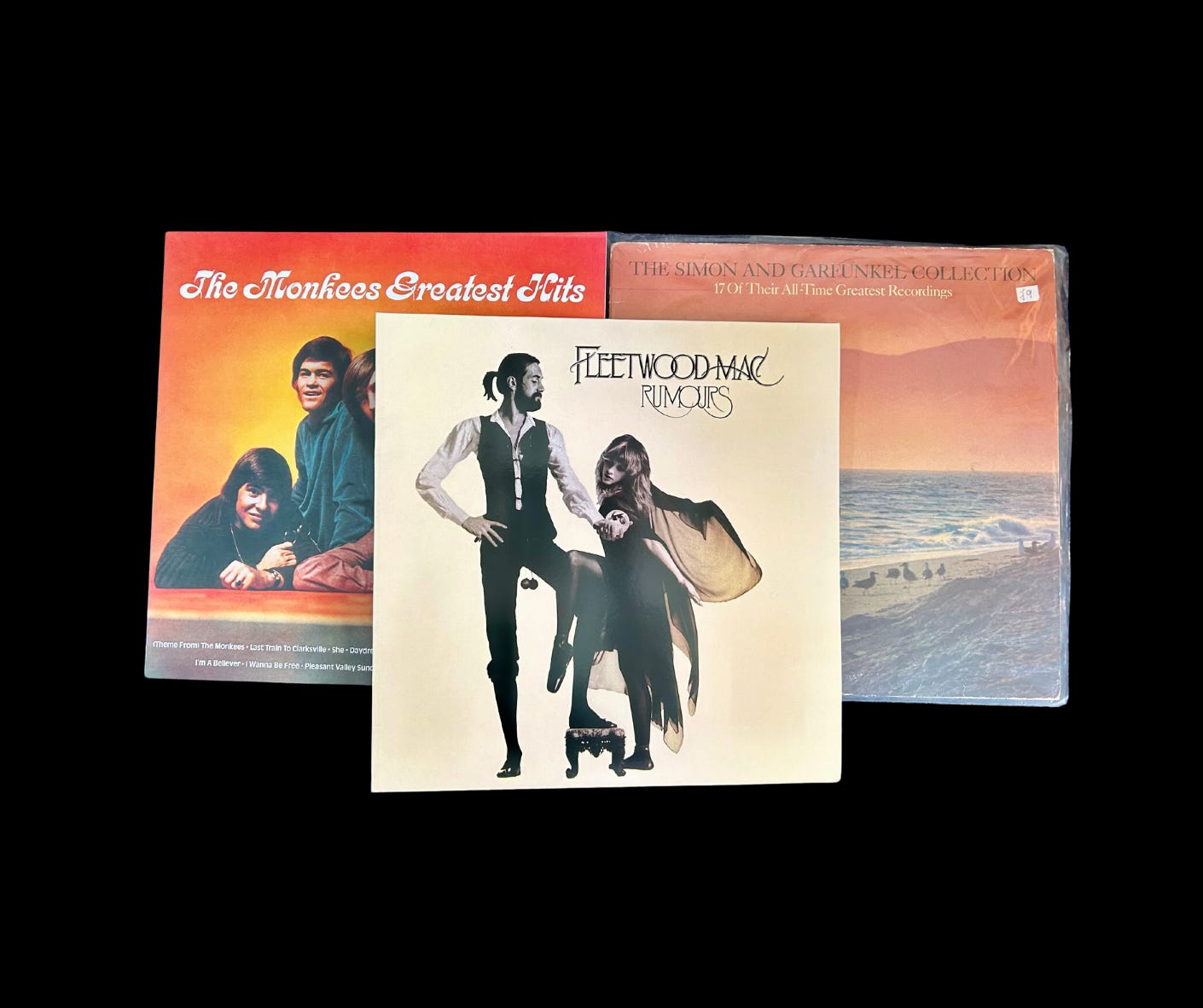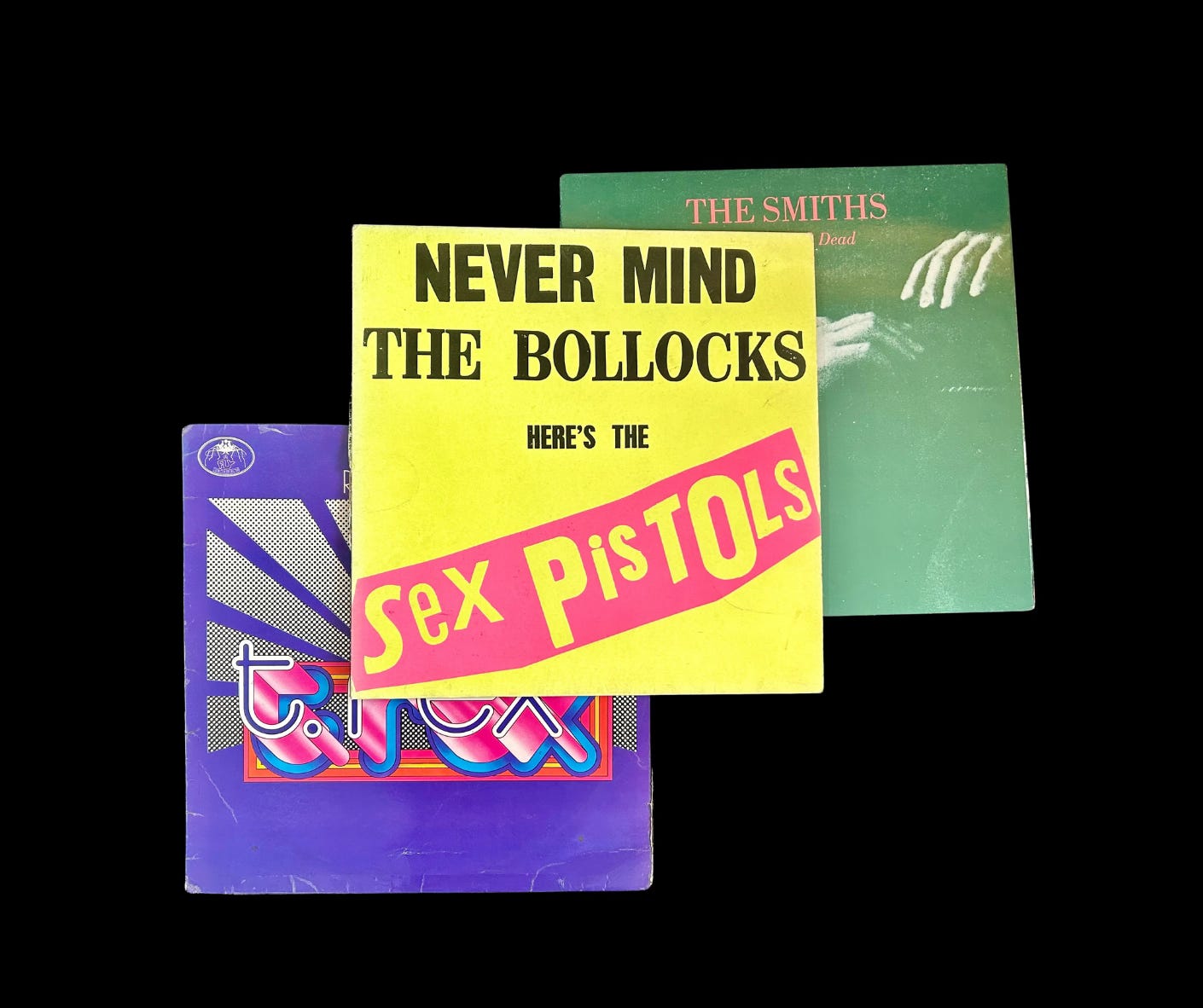my music taste is a product of what came before me
Exploring the way that music gives us a glimpse into the past and how that affects our present.
In a myriad of ways, we are the way that we are because of our parents. Today, I’m talking music taste, but maybe I’m entirely alone in this thought. When I think of some of my friends, they’re always up to date with the latest artists in the pop sphere. That likely exists entirely outside of their parentage; I doubt anyone was influenced to become a swiftie because of their dad. For many, it’s a joy to discover new artists and there are people that work very hard to market undiscovered talent and share it with the world. To preface, it would be a terrible thing if art just stopped being produced after a certain year, of course. However, I can’t help but feel more of an affinity with the sounds of a generation I’ve never lived through.
My music taste is a product of what came before me, and their music taste is a product of what came before them. Whilst I’m talking about the way I’ve been influenced by my parents and grandparents, I’m also aware I can apply this in a very sweeping way to music in general. Nothing exists in a vacuum and art exists in response to (either influenced by or in rejection of) the artistic values and traditions that came before it and the social and political events of any given time.
Just with a quick Google search, there are countless articles on the 10 ways The Beatles changed the world of music forever, The cultural impact of The Beatles, and How The Beatles changed music history. There’s no denying just how much those four Liverpudlians impacted what came after them, but they didn’t appear out of nowhere. The Beatles themselves were inspired by the likes of Chuck Berry, Buddy Holly or The Everly Brothers. Rock and roll developed from rhythm and blues music of the 1940s, which itself was amalgamated from a multitude of different sounds – blues, jazz, gospel, swing music etc. The majority of these music genres originated from Black communities, many from the Deep South in the US. The phrase ‘rock and roll’ was popularised from African American slang, referring to dancing and swaying to a rhythm, but was also a euphemism for sex.
At some point in time, we’ve departed from the sounds of Greensleeves and embraced styles like synth-pop and techno, only made possible with evolving technology. It’s been a journey. Never random, always purposeful, even if it’s within an artist’s subconscious.
I like what I like because of my parents. Whilst there might be a gene that influences how I feel about coriander or my bitterness receptors, I’m sure music taste is more about exposure than genetics or DNA. I’m drawn to music from the sixties, seventies and eighties, despite being born on the cusp of the 20th century in 1999.
My mum, a child of the seventies and teenager in the eighties, caught onto bands like The Monkees, Simon and Garfunkel and Fleetwood Mac because of her own dad. Don’t get me wrong, she definitely listened to the chart music of her own era; she still watches Top of the Pops reruns to this day. She was a Bros superfan and probably went to a roller-rink while Madonna blared on the speakers. It’s not about exclusively listening to artists from a bygone age (I’ve had my own experiences as a die-hard One Direction fan), but being introduced to something that you otherwise would never have encountered. Both Simon and Garfunkel and The Monkees broke up in 1970, a handful of years before my mum was born and decades before I came into the picture. But because my grandad influenced her decision to listen to some older bands, they’ve stayed with her throughout her life and now are a huge part of my life too. I have vinyl records from all three of those artists that I’ve bought myself and it feels very full circle.
Speaking of records, I love analogue music; it’s a special sort of ritual to pick out a cardboard sleeve and physically flip the vinyl on the turntable myself. When I first bought my record player, my dad got down their record collection from the attic, which had been collecting dust since the dawn of cassette tapes. This was what started it all; I was introduced to Adam and the Ants, The Jam and T-Rex. The most important record of all, my new prized possession, is a hand-me-down Billy Joel ‘An Innocent Man’ album. It belonged to my mum, who stole it from my Nanna (although I don’t think she knows either of us have ever had it).
I treasure my dad’s records that he bought with the wages of his first job after leaving school. When I listen to The Jam or the Sex Pistols, I can imagine him as a teen, years away from fatherhood, feeling cool in a leather jacket, watching rugby games and going to the pub every weekend. The working-class influences of punk music mirroring all that I’ve been told about my dad, his brothers and sisters in a Northern English mining town, under Thatcher’s iron fist. It’s not much, but it means a little bit more when I listen to Status Quo or Electric Light Orchestra before finding out they were my uncle’s favourite bands. These albums are my own personal DeLorean time machine, my record player a flux capacitor, going 33rpm instead of 88mph, sending me to the past and giving me a glimpse into what my parents were like in high school. My dad and Noel Gallagher are the same age; he’s forever encapsulated within the track listings of ‘What’s the Story Morning Glory’ as much as its creator.
I’m always in awe of a song like ‘Ghost Town’ by The Specials, which combined ska and reggae, sounds brought to the UK by the Windrush generation. It’s referred to as an ‘all-time classic’ and ‘the coming together of pop and politics’ by the BBC. Britain was in deep economic recession – unemployment rose, industry collapsed. Thatcher’s stop and search policy targeted black children, teens and young adults and was a contributing factor in riots across different parts of the country in 1980 and ’81.
Songwriter Jerry Dammers said, “The lyrics I wrote on tour just seeing what was going down around the country. It was about the recession and three million people on the dole. It's about the police harassment and unemployment. It was like a perfect storm really.” Over 40 years later, the song is still relevant today.
The impact and influence of a song doesn’t stop when it’s produced and released. We take music into a new generation and use it to understand how the social and political landscape of today is the way that it is because of what happened before. Novels like 1984 and The Handmaid’s Tale are brought up often in online discourse, with people commenting on how relevant they remain, especially in the years since Trump was elected as US president. Even when they were written, those novels were inspired by previous historical events. Despite having all this material from the past, lessons we should learn, history has a tendency to repeat itself. And it’s not just novels. Bruce Springsteen’s ‘Born in the USA’ has been adopted by a group of people to express their patriotism, still regularly played on the 4th of July. In fact, ‘Born in the USA’ is an anti-war song, commenting on the government’s treatment of veterans returning from Vietnam and the impossibility of the American Dream. Though not everyone listens to the lyrics; it was used in the campaigns of Ronald Reagan and John McCain.
Whilst I can appreciate the way some songs have stuck with my parents, not everything is going to be a hit for me. With wildly different music tastes between my mum and dad (the former has had multiple Madonna and Erasure albums, Wham singles stolen from her sister and the ABBA Voulez-Vouz album that I treasure, the latter has handed down four records by The Smiths, two from the Sex Pistols and a Sparks album he was given by someone else), they both like The Beautiful South. Their first dance at their wedding was to The Beautiful South’s cover of ‘Everybody’s Talkin’. I don’t particularly care for them, but hearing the openings to ‘Rotterdam’, ‘A Little Time’ or (perhaps inappropriately) ‘36D’ conjures up memories of car rides as a young ‘un to seaside towns on the Yorkshire coast, when I’d probably rather have been listening to Avril Lavigne.
Music connects us. I love hearing about the way other people share music with their parents; when seeing Stevie Nicks live, my friend told me about how she and her dad love the song Landslide and how impactful it was for her to hear live, with all the associations the song has. I went to see Billy Joel live in concert with my mum (my Nanna wasn’t going to trek down to Hyde Park for the concert, but we have all gone to a Billy Joel tribute concert together).
We grow up, grow older; music takes on new meanings. I’m sure my friend will share Landslide with her children and make new memories to infuse with the old ones.
In the way that young children think that the moon follows them, I used to think that music was made specifically about people I knew. I thought the lyric ‘Cheer up, sleepy Jean’ in The Monkee’s ‘Daydream Believer’ was about my Grandma Jean and that Simon and Garfunkel’s ‘Mrs Robinson’ was actually referring to a friend’s mum, also a Mrs Robinson. At that age, we’re not really listening to the lyrics, just enamoured by the sound. I didn’t really care that two people can exist with the same name, but I’m happy with the idea that music takes on a different meaning and perspective when we centre our own lives within it.








